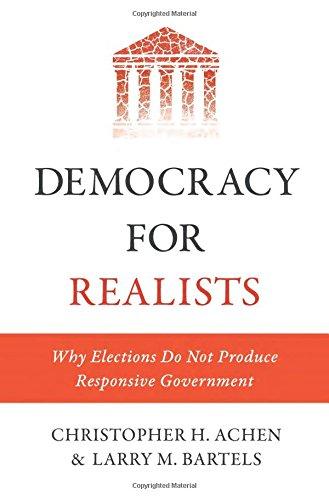Democracy for Realists Summary
6 min read ⌚
 Why Elections Do Not Produce Responsive Government
Why Elections Do Not Produce Responsive Government
Hey, remember when we told you that the Ancient Greeks believed democracy to be the second worst way to organize a country?
And, then, when we took, with Condoleezza Rice, the very opposing view, according to which it is humanity’s best way to counter totalitarianism.
Christopher H. Achen and Larry M. Bartels are here to diligently compare both sides of the argument.
What they end up with is a new theory of democracy, a “Democracy for Realists.”
Who Should Read “Democracy for Realists”? And Why?
In “Democracy for Realists,” Achen and Bartels do their best to transform the popular understanding of democracy.
And, according to none other than Robert D. Putnam, they do this so well, that “anyone interested in democratic theory and American politics” should be all but obliged to read it.
We share his conviction.
About Christopher H. Achen and Larry M. Bartels
 Christopher H. Achen is a professor in the Politics Department at Princeton University, primarily interested in democracy, elections, and public opinion.
Christopher H. Achen is a professor in the Politics Department at Princeton University, primarily interested in democracy, elections, and public opinion.
He has (co-)authored few highly regarded books, including “The Taiwan Voter” (with T. Y. Wang).
 Larry M. Bartels is an American political scientist.
Larry M. Bartels is an American political scientist.
He holds the May Werthan Shayne Chair of Public Policy and Social Science at Vanderbilt University.
He has also authored “Unequal Democracy.”
Both Achen and Bartels are members of the American Academy of Arts and Sciences.
“Democracy for Realists PDF Summary”
Whether direct, representative or constitutional, democracy is always about the value of the individual citizen, i.e., about his right to exercise his power by voting.
As such, it is, by popular opinion, the best political system there was, is and can be.
How can it not be?
It is basically the only system where the individual citizen matters and in which, even if merely by proxy, he actually governs.
And regular people – or so the popular opinion goes – should have this power, since almost every political decision affects them directly.
Unfortunately, if there’s one thing that history has taught us, it is certainly this: popular opinions are often little more than delusions!
And according to Christopher H. Achen and Larry M. Bartels, the aforedescribed “folk theory of democracy” is just another example of them.
In fact, the strange thing is – but isn’t it so with every delusion – how nobody seems to be aware of this.
Because you don’t need a study (though the authors provide thousands of them) to realize that democracy has just about never worked in practice:
The folk theory of democracy is like the ether theory of electromagnetic and gravitational forces: It is based on 19th-century intellectual foundations, and the empirical evidence has passed it by.
Yes, you’ve read that right:
Believing in democracy is not much different from believing that all matter is composed of the four classical elements or that the Earth is flat!
Why?
Well, to get straight to the main problem, let us quote (with an even lengthier excerpt) an author Achen and Bartels quote themselves, Robert Luskin:
There now seems to be near consensus that by anything approaching elite standards, most citizens think and know jaw-droppingly little about politics…
The average American’s ability to place the Democratic and Republican parties and ‘liberals’ and ‘conservatives’ correctly on issue dimensions and the two parties on a liberal-conservative dimension scarcely exceeds and indeed sometimes falls short of what could be achieved by blind guessing. The verdict is stunningly, depressingly clear: most people know very little about politics…
In other words – and this is, once more, according to verifiable studies and statistical data – in most cases (which means, more than 50%), voters don’t know what they are voting for or against.
Rational thinking has nothing to do with either politics or democracy: Democrats are Democrats because their parents and grandparents had been Democrats; Republicans are Republicans because their parents and grandparents had been Republicans.
It’s basically as simple as that!
People vote for someone because spiritually and emotionally they feel like they belong in his or her party – not the other way around.
In layman’s terms, a large percentage of people decide who they are going to vote for on loyalty alone. And they become loyal to someone not because they’ve read their programs and know their policies, but because of the family they are born, because of the way the politicians speak and/or look like, or because of their beliefs on a single, sometimes utterly unimportant, issue.
Facts don’t matter one bit: especially not in the long run!
Because, just as in most other spheres, people are strangely myopic in politics as well – that is, they base their decisions not on long-term goals or serious analysis of a politician’s past behavior, but on short-range objectives and the politician’s results from the last half a year.
And sometimes, it’s even worse.
Way worse!
That is, more often than not, people vote against someone retroactively because of things he/she had no control over.
For example, back in 1916, a great white shark killed five people in New Jersey, and, suddenly, 10% of the people living in its beach communities lost their belief in the politics of then-president Woodrow Wilson.
Even stranger, almost a century after this, Al Gore lost 2.8 million voters because of the floods and droughts of 2000!
Ironically – since Al Gore won a Nobel Peace Prize seven years later exactly because of his climate change activism.
And here’s the worst part of democracy:
Because of all of the above, as stated in the subtitle of Achen’s and Bartels’ game-changing book, elections don’t produce responsive governments.
Why should they?
Incumbents are fully aware that their platforms don’t need to match their actions: either way, for their loyal voters, they’ll remain what they had been before (keyword: cognitive dissonance).
And even the most serious scandals will be forgotten or dulled in time.
So, is there a way out?
Possibly.
It starts with doing away with the outdated folk theory of democracy.
Ironically, as long as we believe that people have power in democratic societies, elites will profit, and people will be on the losing end of history.
Key Lessons from “Democracy for Realists”
1. The Folk Theory of Democracy Has Nothing to Do with Experience or Reality
2. In Democracy, Facts Don’t Matter: Gender, Religion, and Ethnicity Do
3. Voters Suffer from Foolishness and Short Sightedness
The Folk Theory of Democracy Has Nothing to Do with Experience or Reality
The “folk theory of democracy,” rooted in the belief of the Enlightenment that people are rational beings, is “the idea that citizens make coherent and intelligible policy decisions, on which governments then act.”
However, in practice, this couldn’t be further from the truth!
As we can easily deduce from a simple historical analysis, people are incapable of making the right choices, allowing politicians to be utterly uninterested in working for their benefit.
Just think about this way:
Most of the bad governments you’ve heard about were chosen by people.
Yes, that includes Hitler!
In Democracy, Facts Don’t Matter: Gender, Religion, and Ethnicity Do
Voting has little to do with facts and platforms.
In fact, studies have shown that your voting behavior is largely already decided and there’s a little chance that it will ever change.
Cases in point:
True, the issue of abortion resulted in many women abandoning the Republic party, but most men merely (and quite suddenly) changed their views once their Party did: it just didn’t concern them personally.
Also, during the 1960s, people supported the Kennedys only if they had a good feeling about Catholicism.
Finally, whether Boston voters supported Roosevelt’s New Deal policies depended much on their ethnicity.
And little on their understanding of it.
Voters Suffer from Foolishness and Short Sightedness
Most voters, says Robert Luskin, “know jaw-droppingly little about politics.”
But, they still vote.
And, usually, they make a decision based on their experience from the six months leading up to the election.
An analysis of 16 US presidential elections uncovered a convincing correlation between income growth and voting behavior.
However, even economists don’t know why your wages increase sometimes. It turns out that if this happens while someone is in power, you’ll vote for him once again, forgetting about almost everything else during his/her rule, be it racial injustice or crimes against humanity.
Don’t believe us?
Well, that’s basically how Hitler won in 1932.
Like this summary? We’d like to invite you to download our free 12 min app, for more amazing summaries and audiobooks.
“Democracy for Realists Quotes”
Elections are capricious collective decisions based on considerations that ought, from the viewpoint of the folk theory, to be largely irrelevant. Share on X
Democracy is the justifying political ideology of our era. Share on X
The history of democratic thought – including much contemporary political science – is marked by an addiction to romantic theories. Share on X
For most ordinary citizens, ideology is – at best – a byproduct of more basic partisan and group loyalties. Share on X
Most people make their party choices based on who they are rather than on what they think. Share on X
Our Critical Review
“Democracy for Realists” aims to shatter the idealist myth of the always-perfect democratic system, showing convincingly that it is not backed by either history or science.
And, if you ask us, it does this in such a powerful way, that it is really not an exaggeration to say, with John Dilulio, that it’s “the single most important treatise on American democracy published in several decades.”
Emir is the Head of Marketing at 12min. In his spare time, he loves to meditate and play soccer.


 Why Elections Do Not Produce Responsive Government
Why Elections Do Not Produce Responsive Government




